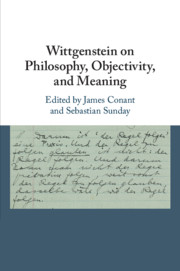Book contents
- Wittgenstein on Philosophy, Objectivity, and Meaning
- Wittgenstein on Philosophy, Objectivity, and Meaning
- Copyright page
- Contents
- Contributors
- Preface
- Acknowledgments
- Chapter 1 Anatomy of a Muddle: Wittgenstein and Philosophy
- Chapter 2 Explaining What We Mean
- Chapter 3 Objectivity
- Chapter 4 The Methodological Significance of Intuitions in Philosophy
- Chapter 5 Wittgenstein on ‘Seeing Meanings’
- Chapter 6 Bringing the Phenomenal World into View
- Chapter 7 First Steps and Conceptual Creativity
- Chapter 8 Wittgenstein and Analytic Revisionism
- Chapter 9 Demystifying Meaning in Horwich and Wittgenstein
- Chapter 10 What Is Meaning? A Wittgensteinian Answer to an Un-Wittgensteinian Question
- Chapter 11 Meaning, Use, and Supervenience
- Chapter 12 Some Socratic Aspects of Wittgenstein’s Conception of Philosophy
- References
- Index
Chapter 1 - Anatomy of a Muddle: Wittgenstein and Philosophy
Published online by Cambridge University Press: 15 August 2019
- Wittgenstein on Philosophy, Objectivity, and Meaning
- Wittgenstein on Philosophy, Objectivity, and Meaning
- Copyright page
- Contents
- Contributors
- Preface
- Acknowledgments
- Chapter 1 Anatomy of a Muddle: Wittgenstein and Philosophy
- Chapter 2 Explaining What We Mean
- Chapter 3 Objectivity
- Chapter 4 The Methodological Significance of Intuitions in Philosophy
- Chapter 5 Wittgenstein on ‘Seeing Meanings’
- Chapter 6 Bringing the Phenomenal World into View
- Chapter 7 First Steps and Conceptual Creativity
- Chapter 8 Wittgenstein and Analytic Revisionism
- Chapter 9 Demystifying Meaning in Horwich and Wittgenstein
- Chapter 10 What Is Meaning? A Wittgensteinian Answer to an Un-Wittgensteinian Question
- Chapter 11 Meaning, Use, and Supervenience
- Chapter 12 Some Socratic Aspects of Wittgenstein’s Conception of Philosophy
- References
- Index
Summary
Ludwig Wittgenstein has a recognizable approach that he regularly pursues in his philosophical investigations. There is a problem that he often presses, a form of criticism that he often develops, against traditional pursuits of philosophy. It is surprisingly difficult to say clearly what this problem is. But it is worthwhile to try, for this criticism is not only a hallmark of his thought but is also closely connected to other central features of it, for instance, to his conceptions of language and of the nature of philosophical investigation. These features can be properly understood only in concert with a correct view of his terms of criticism of traditional philosophy. In this essay, Alexander George articulates a problem Wittgenstein sees with philosophy, shows how it illuminates otherwise peculiar features of Wittgenstein’s investigations, and finally considers an interesting situation in which Wittgenstein’s goals might be thwarted.
- Type
- Chapter
- Information
- Wittgenstein on Philosophy, Objectivity, and Meaning , pp. 1 - 27Publisher: Cambridge University PressPrint publication year: 2019

